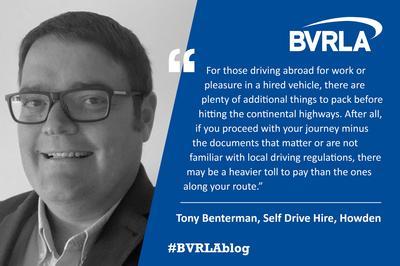Tony Benterman, Account Executive in the Self Drive Hire team at insurance provider Howden takes a look at what documents you need where, and how to make sure your drivers and customers driving in Europe are ready for the road ahead.

For those driving abroad for work or pleasure in a hired vehicle, there are plenty of additional things to pack before hitting the continental highways. After all, if you proceed with your journey minus the documents that matter or are not familiar with local driving regulations, there may be a heavier toll to pay than the ones along your route.
Don’t forget to (always) have your driver’s licence on you
First and foremost, aside from ensuring you drive on the correct side of the road, anyone renting or leasing a self drive hire (SDH) vehicle must have their UK driver’s licence with them – preferably at all times, but most definitely if driving.
If you hold a UK-issued photocard driver’s licence, then what you don’t need for driving in the EU, Switzerland, Iceland or Liechtenstein is the International Driving Permit (IDP). However, you may require an IDP to drive in some EU countries and Norway if you only have a paper driving licence or a licence that was issued in Gibraltar, Guernsey, Jersey or the Isle of Man.
It’s useful to check if you do need a £5.50 IDP which can be obtained from various retail outlets that have PayPoint.
A further recommendation is that drivers take an IDP regardless – just in case you cross a border into a country that asks for one!
What type of vehicle insurance is required for driving in Europe?
All UK vehicle insurance provides the minimum third party cover to drive in the EU - including Ireland, but bear in mind that proof of vehicle insurance is required. So, make sure you have paper documentation on you or that you’ve printed out anything from your insurance app, so it’s easy to provide a copy if necessary.
And while that bare minimum of third party insurance is built into your basic vehicle cover, it’s strongly advised that you talk with your broker to check the level of cover required and whether you need to inform your provider that you’re driving your vehicle in Europe.
The rules about the Green Card – AKA the International Motor Insurance Card – were greatly relaxed in 2021. To be clear, this is no longer required for driving in the EU (including Ireland), Andorra, Bosnia and Herzegovina, Iceland, Liechtenstein, Norway, Serbia, or Switzerland.
What vehicle registration documents are needed, and what happens if they cannot be produced?
Assuming the driver is either taking a pleasure trip or making a delivery or goods pick up, the vehicle log book (V5C) is necessary, plus a VE103 which is a ‘vehicle on hire’ certificate and proof you’re allowed to use a hired, leased or company vehicle abroad. This is also the only legal alternative to producing the vehicle logbook (V5C). BVRLA members can place an order for certificates here.
Not having these documents on you can lead to a variety of outcomes, depending on which country you’re driving in, but there may well be a fine or the vehicle impounded. Without a ‘vehicle on hire’ certificate, be prepared that this could temporarily be the end of the road.
UK stickers and number plates
Following the UK’s exit from the EU, number plates are no longer issued with the EU symbol, and national identifier on vehicles registered in the United Kingdom while in Europe is a UK sticker, and no longer GB. When a number plate includes the UK identifier with the Union flag, a UK sticker isn’t needed, but a UK sticker must be clearly displayed clearly on the vehicle’s rear if your number plate has any of the following:
- A GB identifier with the Union flag
- A Euro symbol
- A national flag of England, Scotland or Wales
- Numbers and letters only – no flag or identifier.
Driving in Spain, Cyprus or Malta? Then it’s required that you display a UK sticker no matter what is on your number plate. You don’t need a UK sticker or identifier to drive in Ireland.
Is there any required equipment when driving in Europe?
Many countries across Europe require drivers across all vehicle groups to carry certain equipment, so it’s well worth taking the time to establish what’s needed where in order to avoid fines and penalties. For those entering and exiting multiple countries, we advise drivers to carry all of the following:
- Reflective jackets (one for each passenger and kept within the cabin of the car)
- Warning triangle (compulsory in most countries)
- Headlamp beam deflectors (depending on your vehicle, you’ll either need deflector stickers or adjust the beam manually)
- Safety helmets, compulsory for riders and passengers of motorcyclists and moped users
- UK car sticker (if you don’t have a GB Euro number plate, or no matter what's on your number plate when driving in Cyprus, Malta or Spain)
- First aid kit (compulsory in Austria, France and Germany).
Full details can be found via the Urban Access Regulations in Europe website.
Congestion charges and other additional expenses
Like cities in the UK, there are many parts of Europe, particularly urban zones, where vehicles registered abroad will have to pay an additional fee. Again, it’s useful for drivers to be aware of these in advance and ensure where possible these costs are met in advance through the appropriate app or website. These may vary depending on whether the type of vehicle it is, and whether it’s diesel, petrol, or electric.
Keep to the rules of the road
Different countries and regions driving rules and penalties can fluctuate quite dramatically. Offences for driving under the influence of drugs or alcohol for example may be an instant ban or even imprisonment. But let’s take a moment to focus on what might seem like lesser ‘crimes’ but with big consequences. The Scandinavian countries tend to have the highest fines for speeding; for going 20mph OVER the speed limit, Norway’s minimum fine is currently 585€, while parking for longer than permitted tend to be the steepest in Croatia. All over Europe, parking in no-parking zone, or even parking badly, may incur a fine. Of course, these are not matters that can be covered be an insurance policy, but anyone hiring a car (and anyone who is hiring the vehicle out) prefers a clean rap sheet.
And in the event of breakdown or accident
A driver experiencing a breakdown or accident abroad may seem like an even more daunting prospect than if this were to happen in the UK. So again, best be prepared for any eventuality and ensure that you and your hire vehicle have the best cover for all the journey and every destination – rather than leaving anything to chance.
Drivers of hired vehicles that are fully aware of what they need when on European roads are not just equipped with the correct paperwork, but also the confidence to handle challenging situations when outside of the UK.
Contact Tony on 0330 008 1343 or [email protected].





